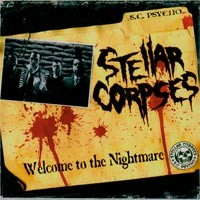Of all the hundreds of sub-genres in bullet points beneath the bold-faced banner of punk rock, psychobilly has to be one of the most divisive, as well as having some of the most stringent rules for qualification. Think about it: You pretty much have to have an upright bass, matching black leather jackets, greaser hair (or a flat-top mohawk), and write apolitical punk crooners with lyrics that run parallel to B-movie horror plots. So while any band that goes to such lengths will verifiably fit in with the rest of their scene, it makes it that much harder to stand out in the crowd.
Consequently, Stellar Corpses' Welcome to the Nightmare is about what you'd expect from a California psychobilly band. Though it's the Los Angeles scene that seems to be booming on any given weekend, Stellar Corpses have created a noteworthy buzz even from deep within their haunted Santa Cruz basement base. While most of their songs are fairly standard fare as psychobilly goes ("Teenage Witchcraft," "Valley of Madness," "Cemetary Man"), there are some major gems on Welcome to the Nightmare. "Hale Bopp" is both amusing and macabre, recounting the 1997 Heaven's Gate mass suicide that coincided with the appearance of comet Hale-Bopp: "Matching pants and matching shawls / Cut your hair and your boyfriend's balls / Come on baby let's do the Hale Bopp!" Some tracks forgo the heavy upright thump in lieu of a slower horror-punk or deathrock style, such as "When You Don't See Me" and, to a lesser extent, "Teenage Witchcraft," which is in more of a latter-day Misfits style. "Can't Keep a Good Corpse Down" features some nice surf-styled guitar licks in one of the better tracks on the album.
Though Stellar Corpses don't break any new ground in sticking with the boundaries their psychobilly forefathers constructed, Welcome to the Nightmare nonetheless demonstrates a competent, driven, and ultimately rather enjoyable take on the narrowly defined genre.
